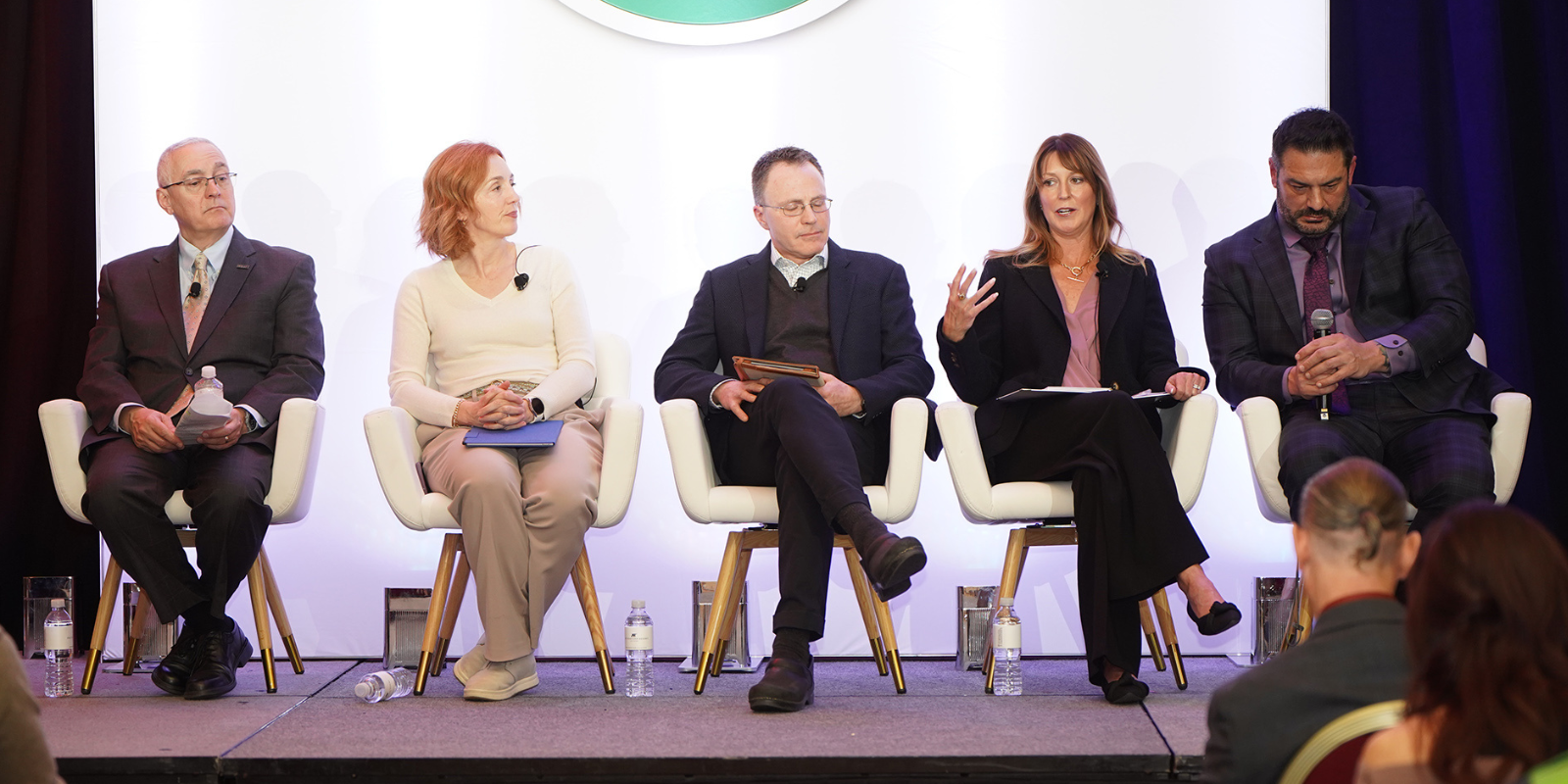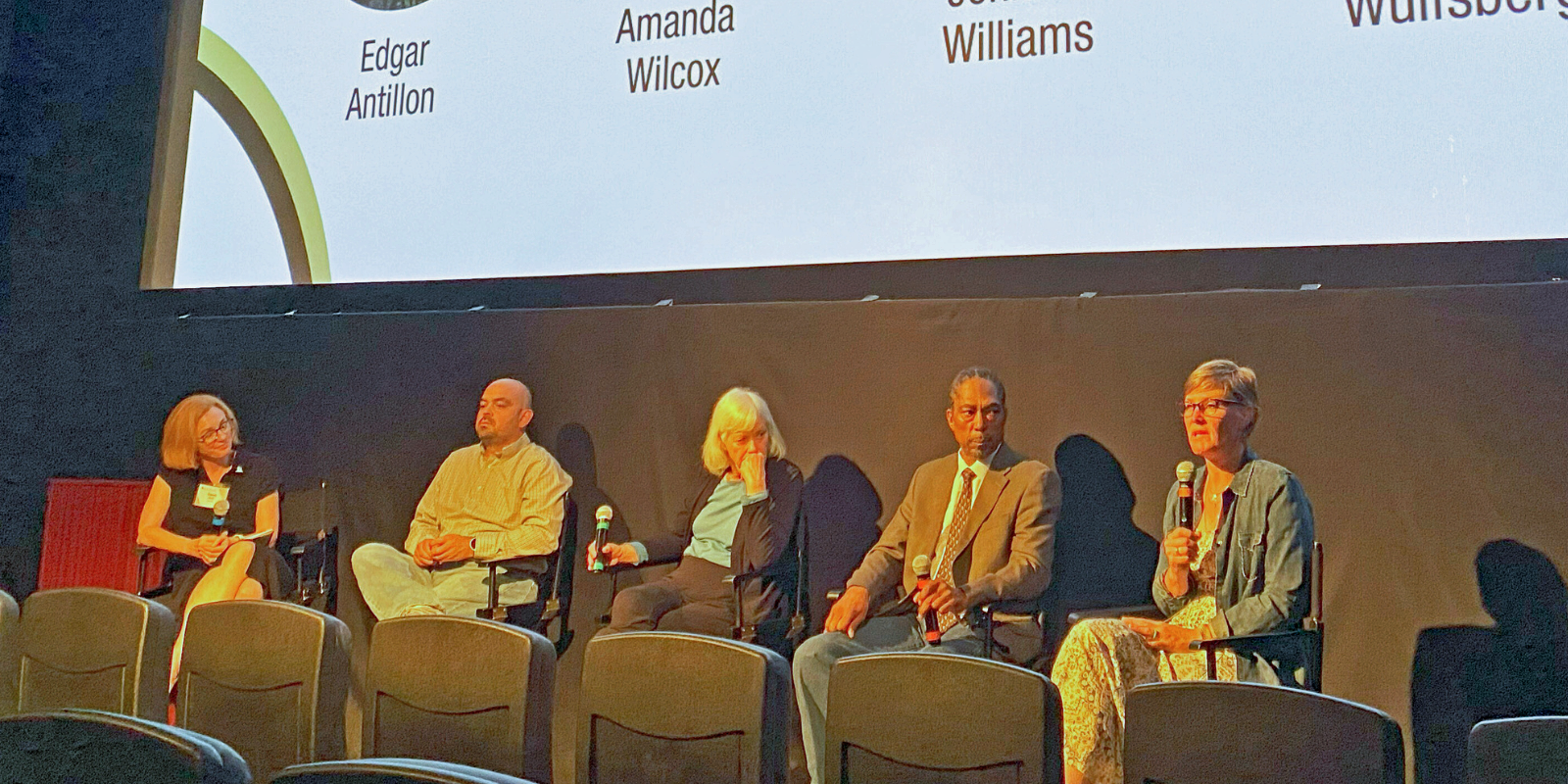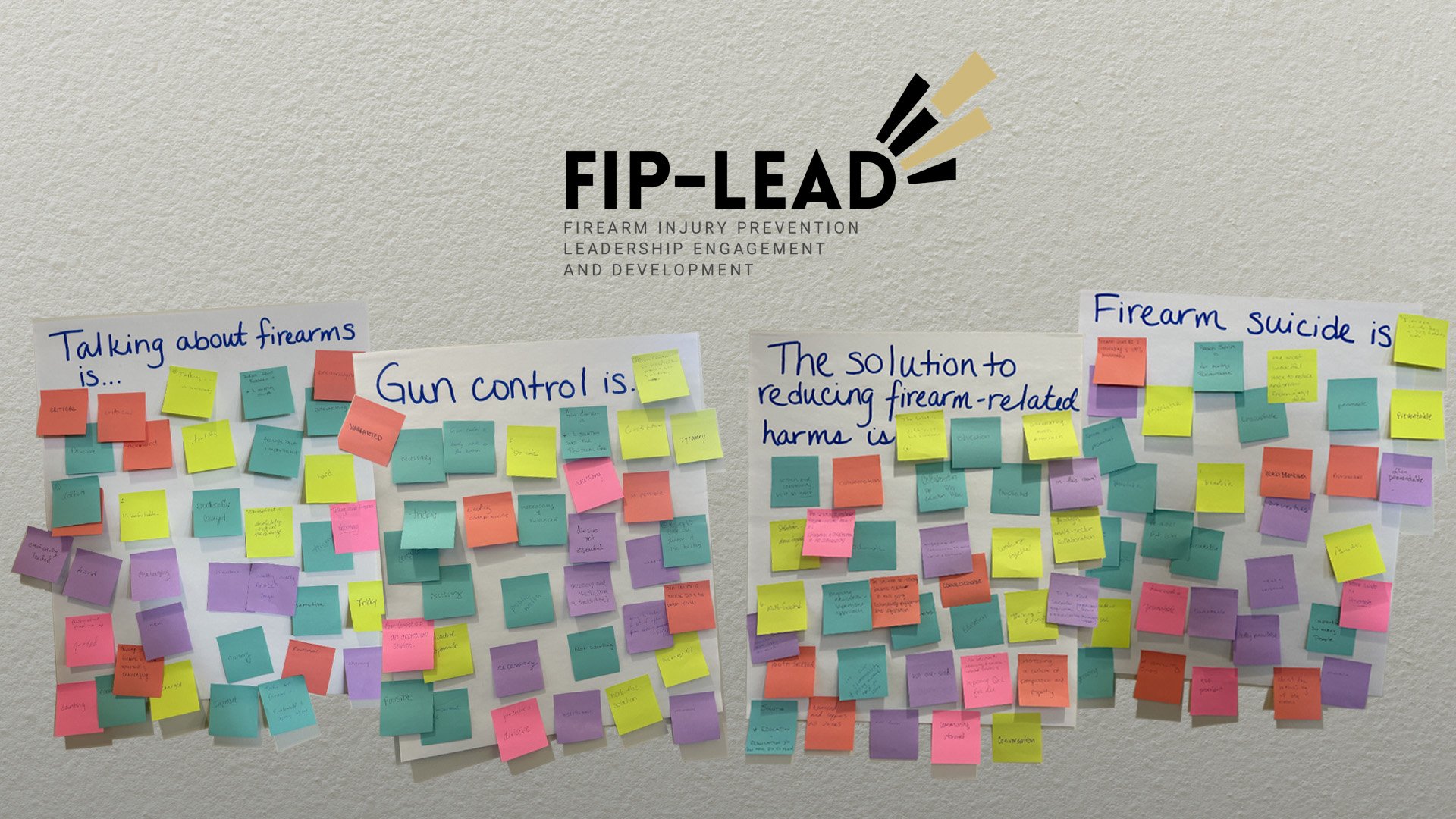Supporting a family member who is struggling with mental health becomes even more crucial when the family member has access to a firearm. Many firearm suicide attempts are made hastily, after only deliberating a few minutes to a few hours, and 90% of attempts are fatal.
These are some of the key messages and statistics that experts from the Firearm Injury Prevention Initiative at the University of Colorado School of Medicine share with firearm-owning community members in hopes of helping them understand how secure firearm storage can help prevent firearm suicide, misuse, and theft. A primary focus of the initiative is to connect with local communities face-to-face, hearing their needs and concerns while taking the opportunity to spread awareness about ways to prevent common situations from becoming lethal.
“Putting any differences in personal beliefs about firearm ownership aside, we all have the shared goal of saving lives and protecting people,” says Matthew Wetenkamp, collaboration and partnerships coordinator for the initiative. “We want to encourage an additional way for firearm owners to be protectors in their communities.”
Staff and students with the initiative, which is directed by Emmy Betz, MD, MPH, professor of emergency medicine, attend a number of firearm-focused outreach events per year, providing resources and collecting anonymous data to help prevent firearm injuries and death.
“We know that simple steps, like storing firearms with locking devices, can help prevent suicide and other causes of firearm injury and death,” says Betz. “We’re excited that, through the initiative, we can work with communities to provide education and storage devices.”
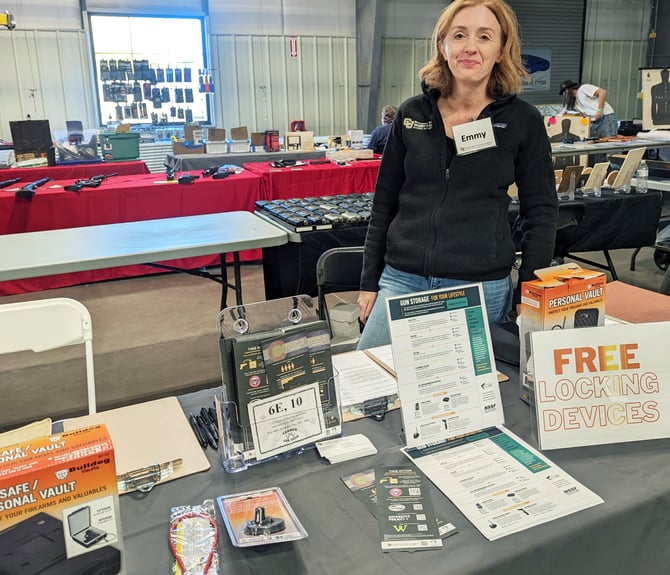
Emmy Betz, MD, director of the Firearm Injury Prevention Initiative, at a recent outreach event
Mutual understanding through outreach
"Anyone can have the worst day of their life. When we, as firearm owners, have the worst day of our life, we have immediate access to the most lethal tool; it’s an arm’s reach away. As an initiative, we promote family and friend interventions, which put time and distance between a person in crisis and a firearm. We raise awareness and provide information and secure storage resources to the community.”
Initiative experts attend firearm shows and other community events throughout Colorado to begin building trusting relationships and to raise awareness of fatality rates due to firearms.
At events, the introductory question Wetenkamp asks community members is, “What is the number one cause of fatal firearm injury?”
“Most community members are shocked to find out it’s suicide,” says Wetenkamp. “Even more surprising is the fact that in Colorado, for every one firearm homicide or accidental death, there are about three firearm suicides. Anyone can have the worst day of their life. When we, as firearm owners, have the worst day of our life, we have immediate access to the most lethal tool; it’s an arm’s reach away. As an initiative, we promote family and friend interventions, which put time and distance between a person in crisis and a firearm. We raise awareness and provide information and secure storage resources to the community.”
Wetenkamp, a United States Marine Corps veteran, is able to relate to the community members he meets. He grew up in a home with firearms, hunting and shooting with his family. After starting his post-military career in intelligence, he was inspired to work in veterans’ services, where he spent 10 years of his career. He focused on promoting mental health and well-being for veterans and worked as an outreach manager at a veteran clinic, which connected him to his current role at the initiative.
“I used to have preconceived notions about the connection between firearms and suicide; many of the same objections I now hear from community members,” he says. “It was research and studies on the connection between at-risk individuals and firearm access that convinced me there are actions individual firearm owners can take to save lives in their families and communities.”
Wetenkamp covers a variety of discussion topics at outreach events, including firearm theft, which could result in stolen guns being used in a crime, protecting children from an accidental firearm injury, interpersonal disputes, domestic violence, and suicide.
He and other members of the initiative collect anonymous questionnaires from community members who stop by the booth to gather new information. The initiative is able to tailor research and outreach on firearm injury prevention based on the questionnaires. A month after collecting questionnaires, Wetenkamp reaches out to individuals, who voluntarily provided their email addresses, to ask follow-up questions about their beliefs and the way(s) they store their firearms. During the past three outreach events, the initiative collected 450 questionnaires from the community.
“Each conversation is the opportunity to protect an individual,” Wetenkamp says. “If only one of those 450 people takes action when someone they know is in crisis, that can save a life.”
Resources to save lives
“I believe that open, honest, and respectful conversations, particularly with a fellow gun owner, can be incredibly powerful in changing beliefs and behaviors. I want to show people that we don’t have to choose between protecting our communities or our gun rights; we can do both.”
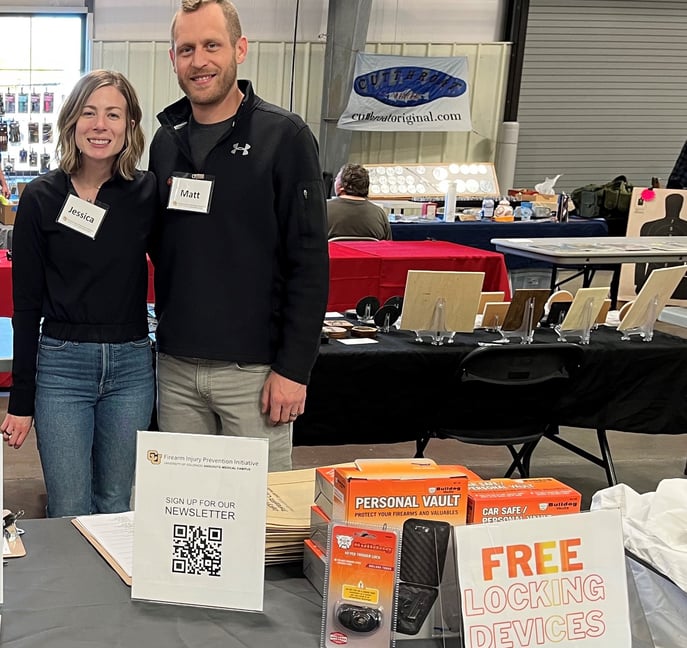
Jessica Buck-Atkinson, program director, and Matt Wetenkamp, collaboration and partnerships coordinator, at a recent outreach event
The initiative also offers handgun-sized lock boxes and cable locks at the events. These resources, Wetenkamp says, are a ticket to starting those conversations.
“We are able to explain how the locking device works and why you might consider using one,” he says. “Perhaps more importantly, it’s a way to start the conversation and raise awareness on these harrowing statistics on firearm deaths in Colorado.”
Sometimes, attendees ask about additional resources for those who are struggling. Wetenkamp says that’s an important conversation to have, but each individual case might require different types of support.
“For example, if a community member is concerned about a friend’s mental health and has already secured a firearm for them, they can look into mental health professionals or other therapeutic options for their friend,” says Wetenkamp. “If someone is going through a divorce and fired from employment in the same week, maybe they need a friend or family member to support them by connecting them with a good lawyer, or reaching out to the community for employment opportunities. This type of conversation is an opportunity to encourage being a protector in the community, which goes beyond firearm storage.”
If you have a family member or friend who is struggling but isn’t quite ready to open up, saying “I’d sleep a lot better knowing your gun is locked up with me, even if it’s just for tonight” can be a good way to show you care and might save someone’s life, he says.
Since the launch of the initiative in April, Betz, Wetenkamp, and other initiative leaders are working to expand the initiative’s team of researchers and outreach team members. Wetenkamp’s team will participate in more outreach events across Colorado the rest of the year.
“I believe that open, honest, and respectful conversations, particularly with a fellow gun owner, can be incredibly powerful in changing beliefs and behaviors," says Wetenkamp. "I want to show people that we don’t have to choose between protecting our communities or our gun rights; we can do both.”
For additional storage resources, planning, tools, and to view recent research, visit the Firearm Injury Prevention Initiative website.
If you or someone you know needs support, please contact the Colorado Crisis and Support Line at 1-844-493-TALK (8255) or text "TALK" to 38255. You can also go to Colorado Crisis Services to access their chat support. Help and hope are available 24/7/365.
If you are not located within Colorado, please contact the National Suicide Lifeline by dialing 988.

